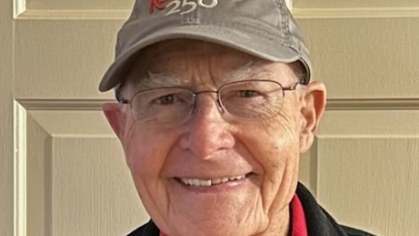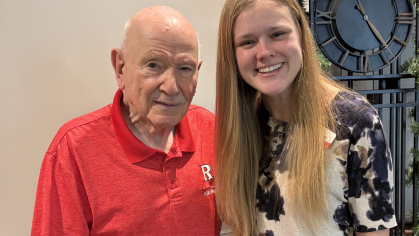We recently had the opportunity to speak with Jeena Williams, an alum of our Intensive Weekend MSW program, about her experience at Rutgers School of Social Work, her work at Division of Child Protection and Permanency (DCP&P), and her thoughts on this year's Social Work Month theme
Tell us a bit about your journey to social work.
I’ll be honest – my undergrad was in psychology and my original interest was pursuing a graduate education in that field. However, when I had an opportunity to join an employee-sponsored MSW program, I was motivated to try social work since I had already been working in the field as a child welfare worker, and it was a great program designed with flexibility for working professionals. When I enrolled in the Intensive Weekend MSW program, I actually fell in love with social work because of the person-in-environment perspective. I felt that the social work approach was much more comprehensive than my previous studies in psychology because of the focus on a person’s external environment in addition to their internal experiences. I loved social work so much, that I decided to obtain a Ph.D. in it as well, and I now teach social work courses at Montclair State University and Ramapo College. I really enjoyed the MSW program and the critical thinking and analysis that was encouraged to improve our service to children and families. I felt that obtaining a doctorate would be a way to further enhance my skills, and I chose to concentrate on child and family policy, which is very relevant to my career.
Why did you choose to attend the Intensive Weekend program at Rutgers SSW?
The main reason was flexibility. Since I was a full-time state employee, this was the best way to fit a graduate education into my schedule. My son was only two years old at the time, so the program’s schedule allowed me to find the family-work-school balance I needed.
What advice would you give to prospective students who are considering the Intensive Weekend program?
I highly recommend the program. If I was able to do it while juggling a demanding job and a toddler, I feel like anyone can do this! I actually looked forward to classes as the “me time” I needed to take a break from all my other responsibilities and spend some quality time with my colleagues learning about topics that I am passionate about. In a way, it was a form of self-care. Of course, it was academically challenging, as graduate school should be, but it was a really great way to invest in my personal and professional growth. I encourage anyone considering graduate education to pursue it – the sooner you start, the sooner you will achieve your goals!
Tell me about the work you’re currently doing with DCP&P.
I serve as a liaison between the child welfare system and the children’s behavioral health system. It’s an extremely challenging but rewarding position, and I have been in it for over 10 years. What I love most about my current role is that I support staff when they need help with some of the most complex situations they face. It’s an opportunity to problem solve, be creative, and build bridges between various disciplines, systems, and providers. No two days are the same; one day I may be meeting with a family to brainstorm services and the next I might be participating in a community organizing event. It’ s a great position for both micro- and macro-level practice and that diversity of duties is what’s kept the work interesting for all of this time.
How has your work changed since the pandemic began?
My heart goes out to everyone who has struggled due to the pandemic. The world has been through a collective trauma, and I try hard to find a silver lining. I actually feel more productive as a result of working from home. Now, instead of taking an hour to drive from one meeting to another, I can hit a Zoom link and jump from one meeting to the next in a matter of minutes. I’ve been able to accomplish a lot more because of this saved time. I also feel that my colleagues and I are even more mindful of supporting each other. Beyond just focusing on the task at hand, we are also checking on how we are personally adjusting to our new environment and offering to lend a hand when needed.
Social Work Month is right around the corner in March, and this year’s theme is “Social Workers are Essential.” What does this theme mean to you?
I feel that social workers are the forgotten first responders. Especially those of us who work in child protection or crisis intervention. Our colleagues have been on the front lines throughout this entire pandemic. Social services are even more essential now with mental health challenges and poverty emerging as central issues resulting from the pandemic. It's great that social workers will get recognized for the important work we've always done, which is even more apparent now that many more people require the support of social services to get through the increased struggles of the last year.
What do you think are some of the most pressing issues in the field of social work right now?
I think the current events of the last year have really highlighted some areas of social work that have always needed more attention: mental health, racial justice, and economic supports. Social work has always recognized the importance of these areas, but last year really showed us that we still have a lot of work left to address these concerns.
While mental health has always been a critical topic for social workers, the pandemic created even new challenges, especially related to isolation and anxiety. The financial impact of the pandemic has also shined a light on how we need more macro-level advocacy from social workers on economic issues like a living minimum wage and income inequality. And finally, the murder of George Floyd has brought to the mainstream what many in the BIPOC communities already knew: we have so many racial disparities in our society ranging from healthcare to the justice system that need to be addressed in a systematic manner. The Social Work Code of Ethics requires us to pursue justice in all these areas, and we need to integrate our work into larger society.
What are your hopes for the future of the field?
That we take on a leadership role in various areas of justice – social, racial, economic, and environmental. I think the social work field is in the best position to lead in these areas because of our ability to understand and intervene in multiple disciplines. Our broad perspective on human needs is what will allow us to create change on both the micro and macro levels so that we can someday achieve sustainable change and equity in society.



